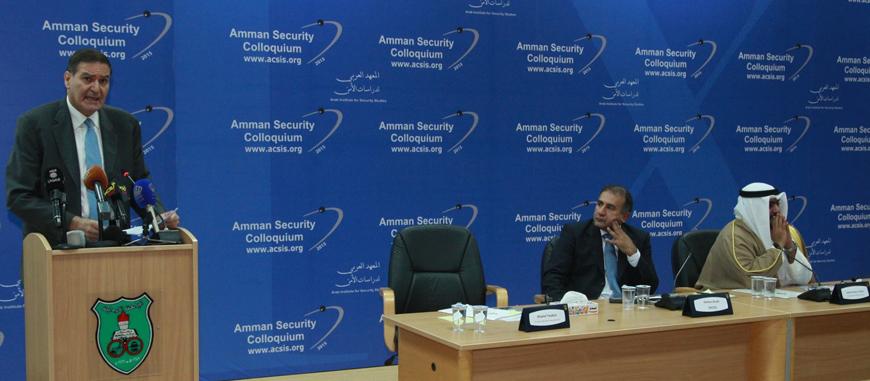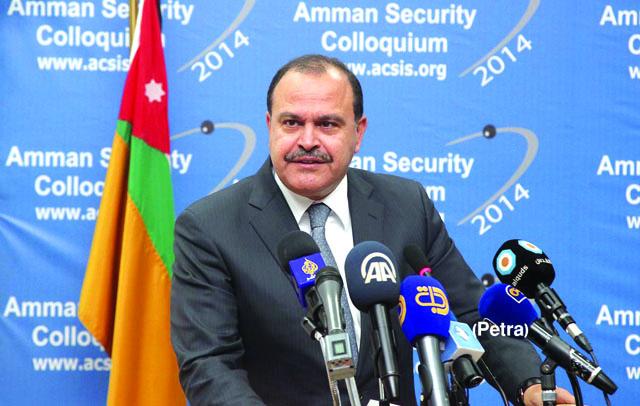You are here
Efforts towards WMD-free zone should not turn blind eye to Israel — Toukan
By Dana Al Emam - Nov 12,2015 - Last updated at Nov 12,2015

Jordan Atomic Energy Commission Chairman Khaled Toukan speaks at the opening of the eighth Amman Security Colloquium on Wednesday (Petra photo)
AMMAN — International efforts to create a weapons of mass destruction free zone (WMDFZ) in the region must “avoid double standards and selective application of the law”, an official said Wednesday.
Speaking at the opening of the eighth Amman Security Colloquium, Jordan Atomic Energy Commission Chairman Khaled Toukan added that world powers have worked against the atomic programmes developed by some Arab countries, including Egypt, Syria and Iraq, while the same countries overlooked Israel’s nuclear capabilities.
Toukan noted that these Arab countries have signed the Nuclear Non-proliferation Treaty that prohibits developing atomic capabilities except for peaceful purposes, while Israel has refused to sign.
These double standards have contributed to the region’s insecurity, a matter that all countries in the Middle East and North Africa should discuss with influential countries with nuclear capabilities in order to enforce international law equally.
Meanwhile, Jordan’s peaceful nuclear project, which started in early 2008, seeks to develop human capacities for related research purposes, generate power and utilise the Kingdom’s uranium reserves, Toukan told an audience of international experts at the colloquium, organised by Konrad-Adenauer-Stiftung at the University of Jordan.
“The aim of the project is to address the county’s growing power problem, which has recently become a threat to the national economy in light of the lack of fossil fuel and the complete dependence on importing fuel from a region that is undergoing political changes,” he said.
Toukan said intensive measures are being taken to ensure the project is safe and transparent.
For her part, Rose Gottemoeller, US undersecretary of state for arms control and international security, highlighted the significance of the Joint Comprehensive Plan of Action (JCPOA) between the P5+1 and Iran in promoting a WMDFZ in this part of the world.
Tehran’s implementation of the deal remains crucial, she said, as the lack of commitment will result in reinstating sanctions against Iran, adding that the success of a WMDFZ depends on the willingness of countries and the assistance of outside parties.
However, there is a “gap” between the commitment of states in the region and Israel’s lack of commitment, but “progress is possible” in the case of face-to-face dialogue, Gottemoeller noted.
Daesh is another challenge to declaring the region a WMDFZ, said NATO Assistant Secretary General Sorin Ducaru, citing concern over the possibility that the terrorist group could use chemical weapons in Syria.
He said the terror group’s “violent ideology” fuels extremism and sectarianism that already exist in the region, adding that the world “must be prepared for worse”.
To combat that threat, the international community must adopt a “broad multinational” effort that does not only use military force to counter Daesh, but also integrates economic, financial and cyber control.
Commenting on Jordan’s efforts in this field in the region, Ducaru said the Kingdom is “one of the NATO’s closest partners”, citing current work on a multi-year project to build Jordan’s capacity to face cyberattacks.
Related Articles
As the region’s instability and political complications linger, Jordan still believes in the importance of creating a weapons of mass destruction free zone (WMDFZ) in the region, Interior Minister Hussein Majali said Wednesday.
AMMAN — Jordan Atomic Energy Commission (JAEC) Chairman Khaled Toukan on Wednesday stressed that building nuclear energy reactors in the Kin
AMMAN — Jordan will chair the first Conference on the Establishment of a Middle East Zone Free of Nuclear Weapons and Other Weapons of Mass

















